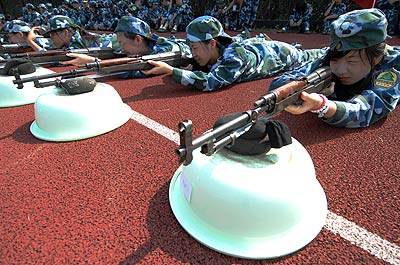(单词翻译:单击)

Although autumn is fast approaching Beijing, the noon heat still burns Chu Jinjing's skin and about other 3,300 freshmen on Tsinghua University's campus.
尽管北京的秋天即将临近,但是正午的高温依旧让楚金晶(音译)和其他3300名清华新生感到无比炙热。
Military training has long been considered a ritual that freshmen must go through in order to officially kick off their college lives. While some question the necessity of such training, many students see military training as a campus tradition that should be maintained.
一直以来,军训都被视为新生正式开启大学生活一项必不可少的仪式。尽管一些人质疑军训的必要性,但很多学生依然认为军训是理应传承下去的校园传统。
Early in February, the Ministry of Education issued a new regulation that colleges and universities should carry out a minimum of 14 days compulsory military training for freshmen.
今年二月初,教育部曾发布新规,要求各大高校必须针对大一新生开设军训必修课,且时间不得少于14天。
In a report by Beijing Evening News, Hou Zhengfang, a Beijing-based education PhD, questioned the benefits of military training.
在刊登在《北京晚报》上的一篇报道中,来自北京的教育学博士侯正方就军训有益与否这个问题提出质疑。
"The training routine does little to improve students' physical fitness over only two weeks time," said Hou. "Maybe some disaster prevention training, such as earthquake survival or escaping from fires would be of greater benefit."
侯正方表示:"短短两周时间的军训对于学生身体健康而言可谓效果甚微。或许一些消防演习、地震等自然灾害的逃生训练对学生更有帮助。"
Meng Yang, a freshman majoring in management at Guangxi University, fainted during training. She said that many students, especially girls, are reluctant to train under direct sunshine.
广西大学管理专业大一新生孟阳就曾在军训场上晕倒过。她说很多学生,特别是女生,都不愿头顶烈日训练。
"For me, military training is physically challenging and even damages my health," said the 19-year-old.
19岁的孟阳说:"对我来说,军训是项体能挑战,甚至会会让我身体吃不消。"
According to Li Jian from the student affairs office of Guangzhou University, blackouts happen frequently during military training and the school has received a lot of complaints from both students and parents.
来自广州大学学生事务处的李建(音译)表示,军训期间学生昏厥事例屡有发生。校方已经接到了一大堆来自学生和家长的抱怨。
"But I still think military training is a good thing," said Li. "Students are easier to manage after the military training."
李建说:"但我仍认为军训是件好事。军训结束后,学生管理工作变得更容易。"
Li also noted that "students became more positive about their new environment after the training".
他也提到,"军训后,学生对于新环境变得更加积极自信了。"
Although Chu Jinjing, a Tsinghua University freshman majoring in medicine, did feel some discomfort while training in sweaty clothes in the glaring heat, the 18-year-old still enjoyed being part of a group going through rigorous exercises.
尽管就读于清华大学医学系的楚金晶确实觉得在炎炎烈日下,穿着被汗水浸透的衣服训练不太舒服,但是18岁的她依然很享受这种集体式的艰苦训练。
"By going through this tough training, students bond faster and a sense of belonging to the school can be cultivated," said Chu. "I made a lot of friends already."
"通过艰苦训练,学生们更快地打成一片,也形成了对学校的一种归属感。"楚金晶说。"我已经交了很多朋友。"
According to the Ministry of Education, the purpose of military training is to teach students discipline, the spirit of teamwork and endurance. But in reality, according to Xiong Bingqi, deputy director of the 21st Century Education Research Institute, the effect is not satisfying.
教育部表示,军训旨在培养学生的纪律意识、团队协作以及吃苦耐劳的精神。而实际上,据21世纪教育研究院副院长熊丙奇介绍说,实际效果并不理想。
"Such goals require long-term cultivation," said Xiong. "It is unrealistic to expect military training to make a difference in only 14 days."
熊丙奇说:"达到这样的目标需要一个长期的培养过程。在短短14天内,要想通过军训来获得较大改善,这不太现实。"
Xiong thus suggests that it should be up to schools to conduct military training in a way that best suits their students.
因此熊丙奇建议,应当由校方自主选择,用最适合自己学生的方式来开展军训。
However, Wang Wenhui, a freshman majoring in automation at Xi'an Jiaotong University, sees military training as a tradition that reaches beyond character building.
而就读于西安交通大学自动化专业的大一新生王文辉(音译)则将军训视为一种超越素质教育范畴的传统。
"From junior and senior high school to college, we join military training to start a new journey," said 18-year-old Wang. "I would feel a bit incomplete without it."
18岁的王文辉说:"从初高中到大学,我们参加军训从此开始一段新的旅程。如果没有军训,我会觉得不完整。"


